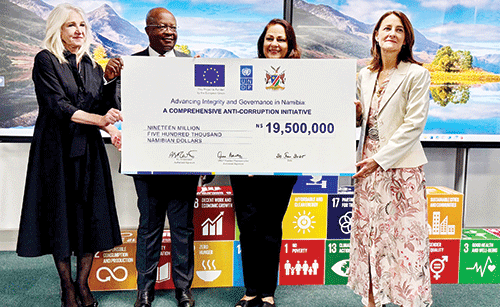The launch of the Good Governance programme in Namibia is a step towards combating corruption and enhancing transparency in the country. This initiative, a joint effort between the European Union (EU) and the United Nations Development Programme (UNDP), aims to reduce corruption and bribery by promoting effective governance practices.
The programme, which will run from 2025 to 2028, is supported by about N$20 million from the EU. Ana-Beatriz Martins, the ambassador of the EU delegation to Namibia, expressed her delight at the launch “This partnership marks a significant step in a journey to promote good governance, transparency and accountability here in Namibia,” she said.
The ambassador highlighted the importance of the programme in supporting Namibia’s national development goals, particularly in building a transparent and equitable society resilient to corruption.
Corruption is a pervasive issue that affects societies worldwide, costing the global economy over US$3.6 trillion annually, which accounts for about 5% of global gross domestic product (GDP).
Martins said this financial drain cripples resources needed for development, exacerbating inequalities, especially when funds meant for healthcare, education, and infrastructure are misdirected or misappropriated.
Corruption also distorts competition, hinders economic growth, and erodes public trust in institutions. Addressing corruption is a global imperative, enshrined in the UN Sustainable Development Goals, to ensure resources reach where they are most needed.
In Namibia, corruption has been a persistent challenge. In 2018, the Anti-Corruption Commission (ACC) recorded over 872 corruption cases, many of which remain unresolved, fuelling public frustration and economic hardships.
ACC Deputy Director General Erna van der Merwe noted that this project will be crucial for the country, providing sustainable development and supporting the implementation of the National Anti-Corruption Strategy and Action Plan (NACSAP).
The Good Governance programme focuses on two key pillars, which are strengthening the management and technical capacity of the ACC, and contributing to the effective implementation of NACSAP. This includes invigorating cooperation with other public institutions involved in fighting corruption.
Alka Bhatia, resident representative of UNDP in Namibia, emphasised that corruption erodes democracy, the rule of law, and citizen trust in public institutions.
“Corruption undermines human rights, state legitimacy and public service delivery, fundamentally undermining equitable growth and perpetuating inequality and exclusion,” said Bhatia.
Moreover, the programme aims to leverage digital transformation to create an environment where corruption cannot thrive.
Embracing innovative technology is essential for transforming governance and advancing transparency. By enhancing access to government data, improving financial management, and strengthening anti-corruption legislation, the initiative seeks to promote a more transparent and accountable governance framework in Namibia.


